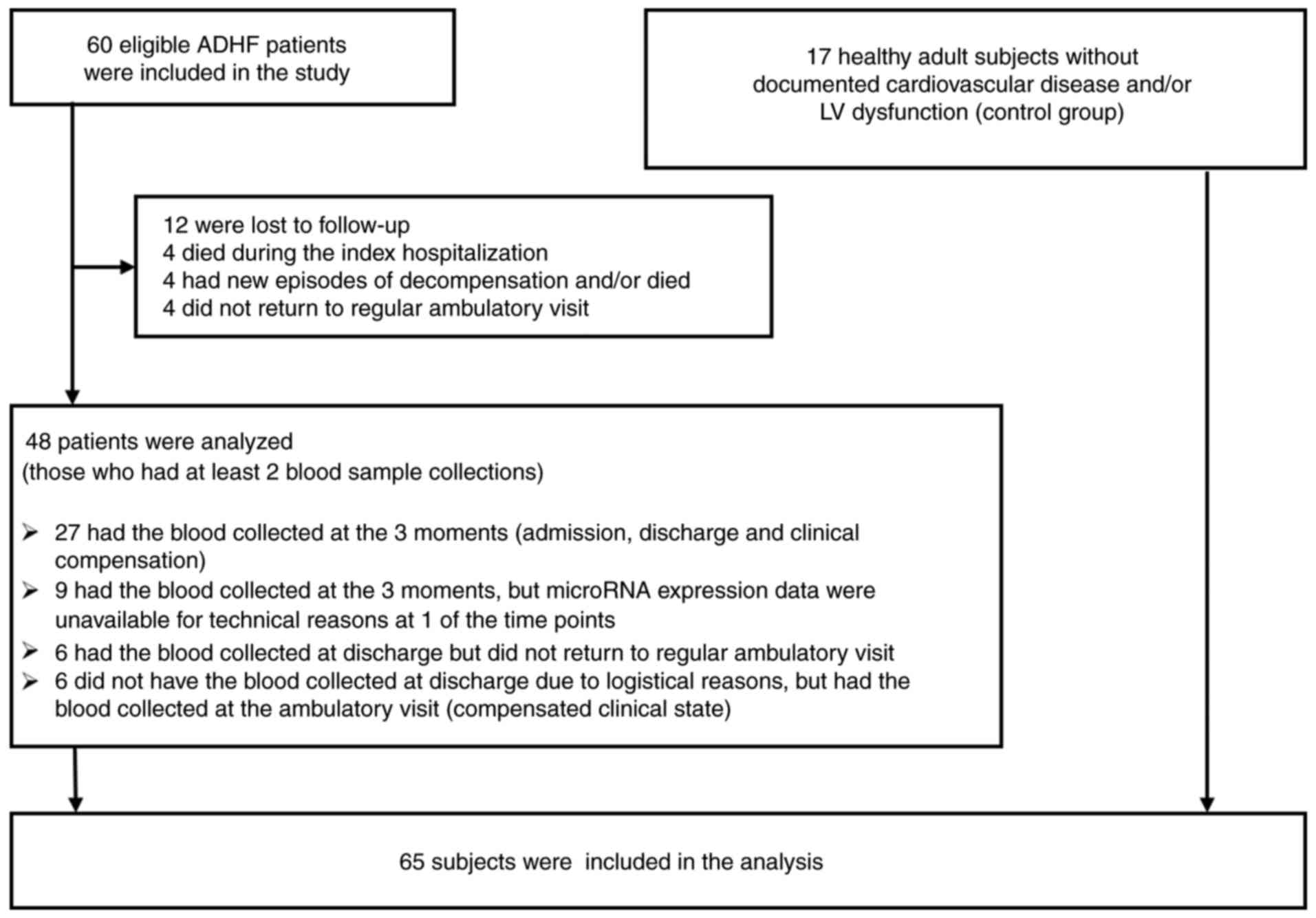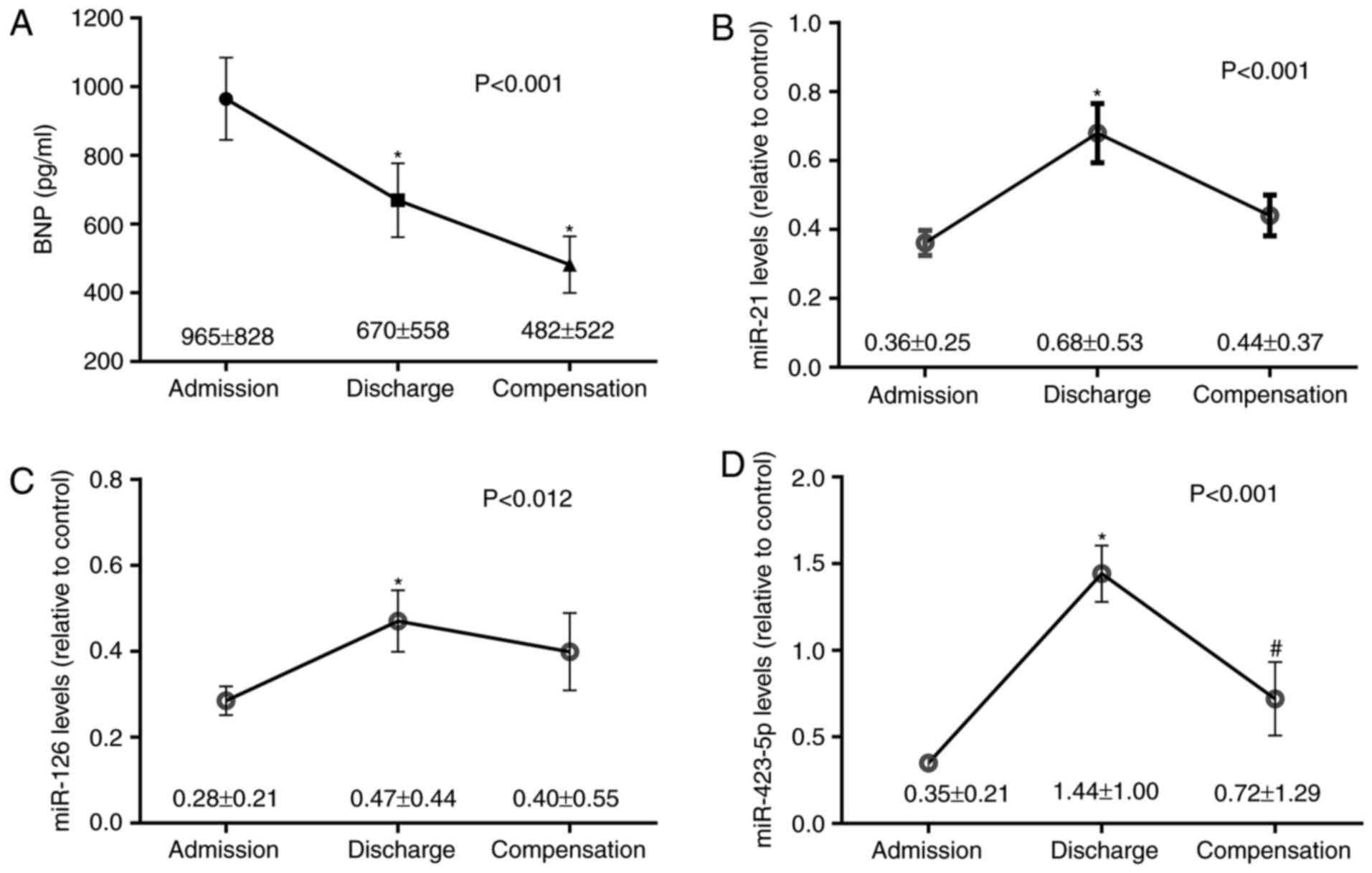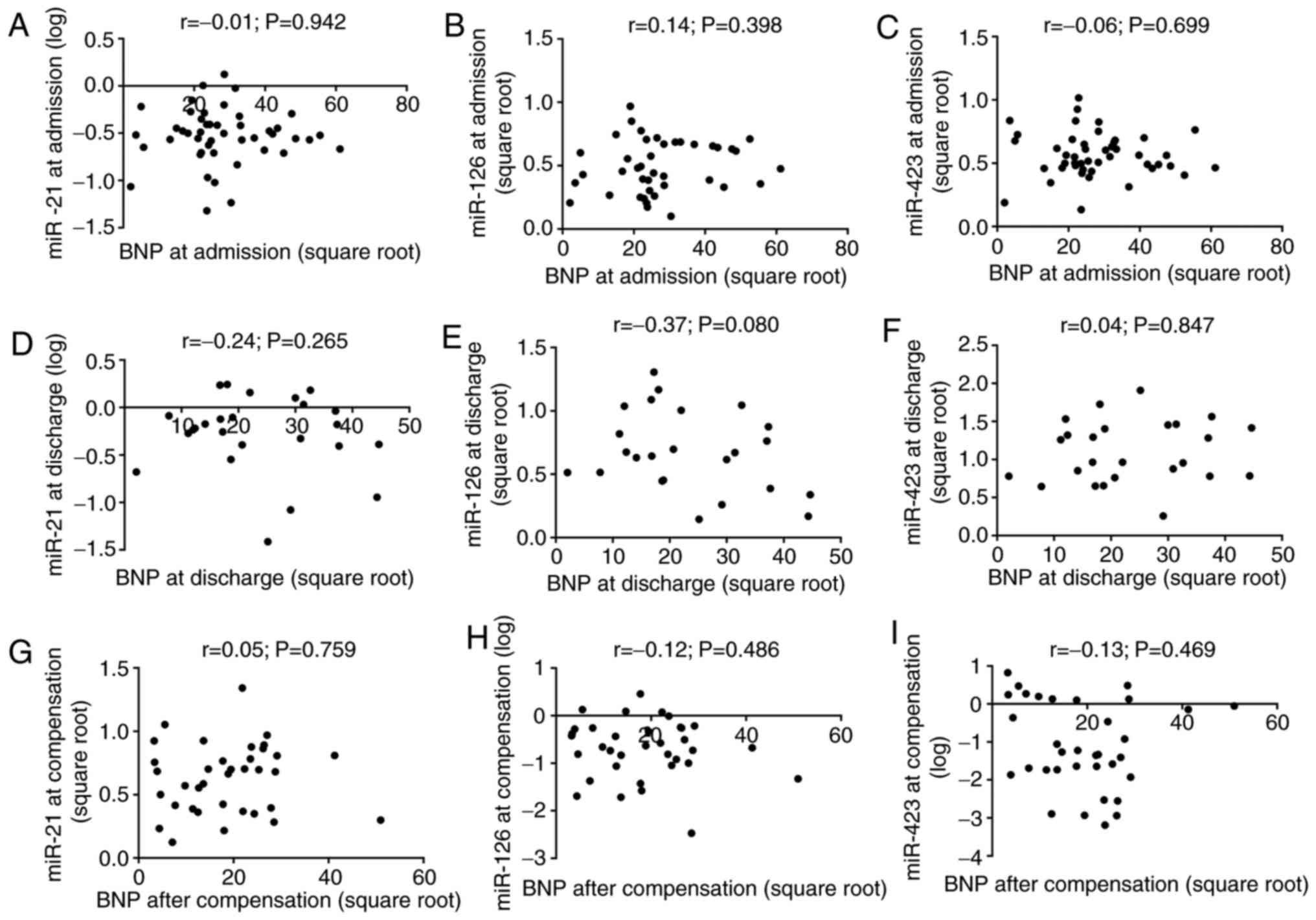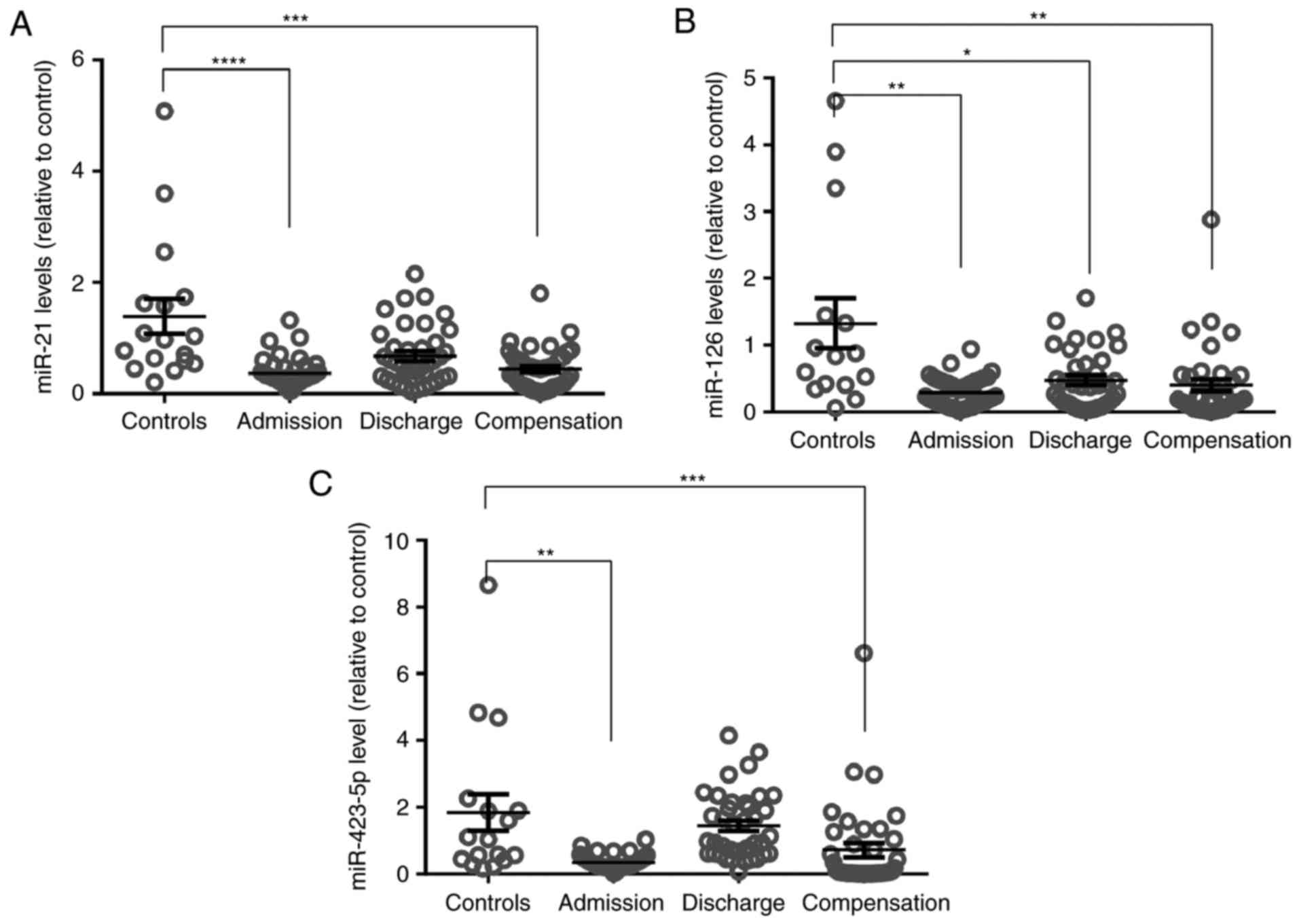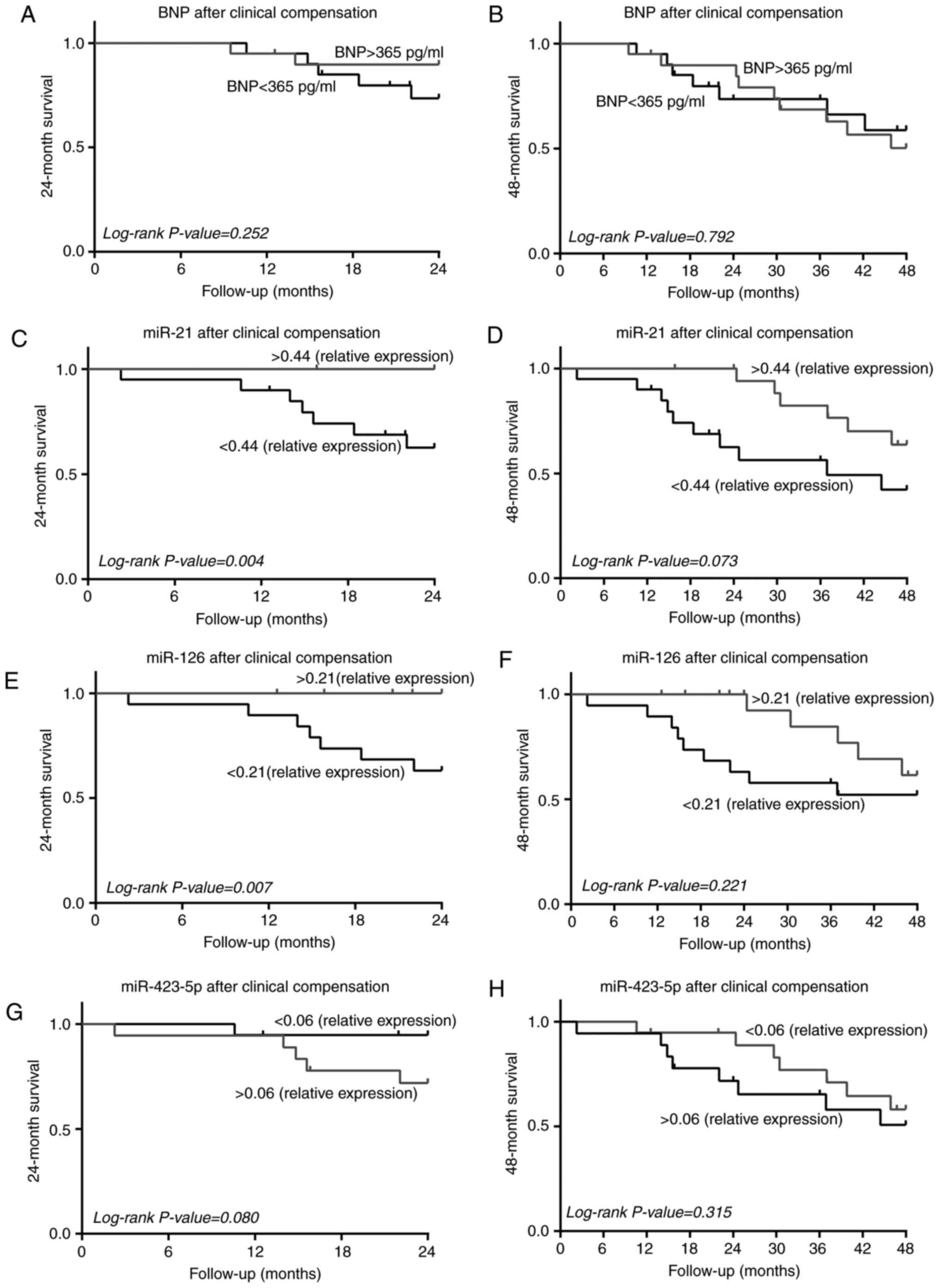|
1
|
Fang YC and Yeh CH: Role of microRNAs in
vascular remodeling. Curr Mol Med. 15:684–696. 2015. View Article : Google Scholar : PubMed/NCBI
|
|
2
|
Small EM and Olson EN: Pervasive roles of
microRNAs in cardiovascular biology. Nature. 469:336–342. 2011.
View Article : Google Scholar : PubMed/NCBI
|
|
3
|
Zhou J, Dong X, Zhou Q, Wang H, Qian Y,
Tian W, Ma D and Li X: MicroRNA expression profiling of heart
tissue during fetal development. Int J Mol Med. 33:1250–1260. 2014.
View Article : Google Scholar : PubMed/NCBI
|
|
4
|
Papageorgiou N, Tslamandris S, Giolis A
and Tousoulis D: MicroRNAs in cardiovascular disease: Perspectives
and reality. Cardiol Rev. 24:110–118. 2016. View Article : Google Scholar : PubMed/NCBI
|
|
5
|
Navickas R, Gal D, Laucevičius A,
Taparauskaitė A, Zdanytė M and Holvoet P: Identifying circulating
microRNAs as biomarkers of cardiovascular disease: A systematic
review. Cardiovasc Res. 111:322–337. 2016. View Article : Google Scholar : PubMed/NCBI
|
|
6
|
Romaine SP, Tomaszewski M, Condorelli G
and Samani NJ: MicroRNAs in cardiovascular disease: An introduction
for clinicians. Heart. 101:921–928. 2015. View Article : Google Scholar : PubMed/NCBI
|
|
7
|
Cakmak HA, Coskunpinar E, Ikitimur B,
Barman HA, Karadag B, Tiryakioglu NO, Kahraman K and Vural VA: The
prognostic value of circulating microRNAs in heart failure:
Preliminary results from a genome-wide expression study. J
Cardiovasc Med (Hagestown). 16:431–437. 2015. View Article : Google Scholar
|
|
8
|
Qiang L, Hong L, Ningfu W, Huaihong C and
Jing W: Expression of miR-126 and miR-508-5p in endothelial
progenitor cells is associated with the prognosis of chronic heart
failure patients. Int J Cardiol. 168:2082–2088. 2013. View Article : Google Scholar : PubMed/NCBI
|
|
9
|
Fukushima Y, Nakanishi M, Nonogi H, Goto Y
and Iwai N: Assessment of plasma miRNAs in congestive heart
failure. Circ J. 75:336–340. 2011. View Article : Google Scholar : PubMed/NCBI
|
|
10
|
Bruno N, Ter Maaten JM, Ovchinnikova ES,
Vegter EL, Valente MA, van der Meer P, de Boer RA, van der Harst P,
Schmitter D, Metra M, et al: MicroRNAs relate to early worsening of
renal function in patients with acute heart failure. Int J Cardiol.
203:564–569. 2016. View Article : Google Scholar : PubMed/NCBI
|
|
11
|
Ovchinnikova ES, Schmitter D, Vegter EL,
Ter Maaten JM, Valente MA, Liu LC, van der Harst P, Pinto YM, de
Boer RA, Meyer S, et al: Signature of circulating microRNAs in
patients with acute heart failure. Eur J Heart Fail. 18:414–423.
2016. View
Article : Google Scholar : PubMed/NCBI
|
|
12
|
Seronde MF, Vausort M, Gayat E, Goretti E,
Ng LL, Squire IB, Vodovar N, Sadoune M, Samuel JL, Thum T, et al:
Circulating microRNAs and outcome in patients with acute heart
failure. PLoS One. 10:e01422372015. View Article : Google Scholar : PubMed/NCBI
|
|
13
|
Xiao J, Gao R, Bei Y, Zhou Q, Zhou Y,
Zhang H, Jin M, Wei S, Wang K, Xu X, et al: Circulating miR-30d
predicts survival in patients with acute heart failure. Cell
Physiol Biochem. 41:865–874. 2017. View Article : Google Scholar : PubMed/NCBI
|
|
14
|
Fan KL, Zhang HF, Shen J, Zhang Q and Li
XL: Circulating microRNAs levels in Chinese heart failure patients
caused by dilated cardiomyopathy. Indian Heart J. 65:12–16. 2013.
View Article : Google Scholar : PubMed/NCBI
|
|
15
|
Goren Y, Kushnir M, Zafrir B, Tabak S,
Lewis BS and Amir O: Serum levels of microRNAs in patients with
heart failure. Eur J Heart Fail. 14:147–154. 2012. View Article : Google Scholar : PubMed/NCBI
|
|
16
|
Tijsen AJ, Creemers EE, Moerland PD, de
Windt LJ, van der Wal AC, Kok WE and Pinto YM: MiR423-5p as a
circulating biomarker for heart failure. Circ Res. 106:1035–1039.
2010. View Article : Google Scholar : PubMed/NCBI
|
|
17
|
Biolo A, Fisch M, Balog J, Chao T, Schulze
PC, Ooi H, Siwik D and Colucci WS: Episodes of acute heart failure
syndrome are associated with increased levels of troponin and
extracellular matrix markers. Circ Heart Fail. 3:44–50. 2010.
View Article : Google Scholar : PubMed/NCBI
|
|
18
|
Sato Y, Yamada T, Taniguchi R, Nagai K,
Makiyama T, Okada H, Kataoka K, Ito H, Matsumori A, Sasayama S and
Takatsu Y: Persistently increased serum concentrations of cardiac
troponin T in patients with idiopathic dilated cardiomyopathy are
predictive of adverse outcomes. Circulation. 103:369–374. 2001.
View Article : Google Scholar : PubMed/NCBI
|
|
19
|
Schulze PC, Biolo A, Gopal D, Shahzad K,
Balog J, Fish M, Siwik D and Colucci WS: Dynamics in insulin
resistance and plasma levels of adipokines in patients with acute
decompensated and chronic stable heart failure. J Cardiac Fail.
17:1004–1011. 2011. View Article : Google Scholar
|
|
20
|
DeAguero JL, McKown EN, Zhang L, Keirsey
J, Fischer EG, Samedi VG, Canan BD, Kilic A, Janssen PM and Delfín
DA: Altered protein levels in the isolated extracellular matrix of
failing human hearts with dilated cardiomyopathy. Cardiovasc
Pathol. 26:12–20. 2017. View Article : Google Scholar : PubMed/NCBI
|
|
21
|
Thomé JG, Mendoza MR, Cheuiche AV, La
Porta VL, Silvello D, Dos Santos KG, Andrades ME, Clausell N, Rohde
LE and Biolo A: Circulating microRNAs in obese and lean heart
failure patients: A case-control study with computational target
prediction analysis. Gene. 574:1–10. 2015. View Article : Google Scholar : PubMed/NCBI
|
|
22
|
Livak KJ and Schmittgen TD: Analysis of
relative gene expression data using real-time quantitative PCR and
the 2(-Delta Delta C(T)) method. Methods. 25:402–408. 2001.
View Article : Google Scholar : PubMed/NCBI
|
|
23
|
Endo K, Naito Y, Ji X, Nakanishi M,
Noguchi T, Goto Y, Nonogi H, Ma X, Weng H, Hirokawa G, et al:
MicroRNA 210 as a biomarker for congestive heart failure. Biol
Pharm Bull. 36:48–54. 2013. View Article : Google Scholar : PubMed/NCBI
|
|
24
|
Wang J, Liew OW, Richards AM and Chen YT:
Overview of microRNAs in cardiac hypertrophy, fibrosis, and
apoptosis. Int J Mol Sci. 17:E7492016. View Article : Google Scholar : PubMed/NCBI
|
|
25
|
Liu R-H, Ning B, Ma X-E, Gong WM and Jia
TH: Regulatory roles of microRNA-21 in fibrosis through interaction
with diverse pathways (Review). Mol Med Rep. 13:2359–2366. 2016.
View Article : Google Scholar : PubMed/NCBI
|
|
26
|
Abdellatif M: Differential expression of
microRNAs in different disease states. Circ Res. 110:638–650. 2012.
View Article : Google Scholar : PubMed/NCBI
|
|
27
|
Topkara VK and Mann DL: Clinical
applications of miRNAs in cardiac remodeling and heart failure. Per
Med. 7:531–548. 2010. View Article : Google Scholar : PubMed/NCBI
|
|
28
|
McManus DD, Tanriverdi K, Lin H, Esa N,
Kinno M, Mandapati D, Tam S, Okike ON, Ellinor PT, Keaney JF Jr, et
al: Plasma microRNAs are associated with atrial fibrillation and
change after catheter ablation (the miRhythm study). Heart Rhythm.
12:3–10. 2015. View Article : Google Scholar : PubMed/NCBI
|
|
29
|
Dickinson BA, Semus HM, Montgomery RL,
Stack C, Latimer PA, Lewton SM, Lynch JM, Hullinger TG, Seto AG and
van Rooij E: Plasma microRNAs serve as biomarkers of therapeutic
efficacy and disease progression in hypertension-induced heart
failure. Eur J Heart Fail. 15:650–659. 2013. View Article : Google Scholar : PubMed/NCBI
|
|
30
|
Li Q, Yu Q, Na R and Liu B: MiR-423-5p
inhibits human cardiomyoblast proliferation and induces cell
apoptosis by targeting Gab 1. Int J Clin Exp Pathol. 9:8953–8962.
2016.
|
|
31
|
Luo P, He T, Jiang R and Li G:
MicroRNA-423-5p targets O-GlcNAc transferase to induce apoptosis in
cardiomyocytes. Mol Med Rep. 12:1163–1168. 2015. View Article : Google Scholar : PubMed/NCBI
|
|
32
|
Olivieri F, Antonicelli R, Lorenzi M,
D'Alessandra Y, Lazzarini R, Santini G, Spazzafumo L, Lisa R, La
Sala L, Galeazzi R, et al: Diagnostic potential of circulating
miR-499-5p in elderly patients with acute non ST-elevation
myocardial infarction. Int J Cardiol. 167:531–536. 2013. View Article : Google Scholar : PubMed/NCBI
|
|
33
|
Goldraich LA, Martinelli NC, Matte U,
Cohen C, Andrades M, Pimentel M, Biolo A, Clausell N and Rohde LE:
Transcoronary gradient of plasma microRNA 423–5p in heart failure:
Evidence of altered myocardial expression. Biomarkers. 19:135–141.
2014. View Article : Google Scholar : PubMed/NCBI
|
|
34
|
Vegter EL, van der Meer P, de Windt LJ,
Pinto YM and Voors AA: MicroRNAs in heart failure: From biomarker
to target for therapy. Eur J Heart Fail. 18:457–468. 2016.
View Article : Google Scholar : PubMed/NCBI
|
|
35
|
Viereck J, Bang C, Foinquinos A and Thum
T: Regulatory RNAs and paracrine networks in the heart. Cardiovasc
Res. 102:290–301. 2014. View Article : Google Scholar : PubMed/NCBI
|
|
36
|
Caroli A, Cardillo MT, Galea R and
Biasucci LML: Potential therapeutic role of microRNAs in ischemic
heart disease. J Cardiol. 61:315–320. 2013. View Article : Google Scholar : PubMed/NCBI
|















